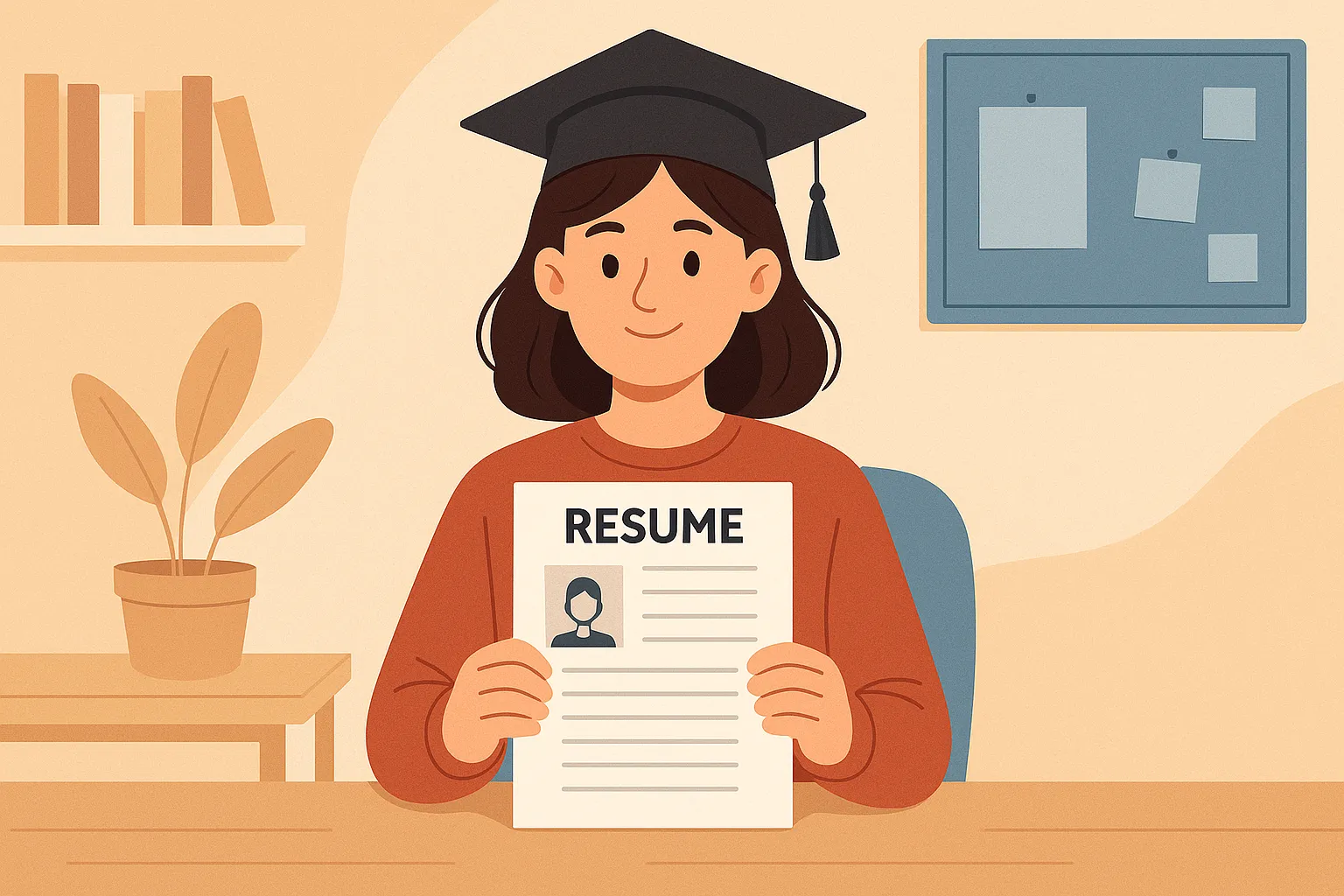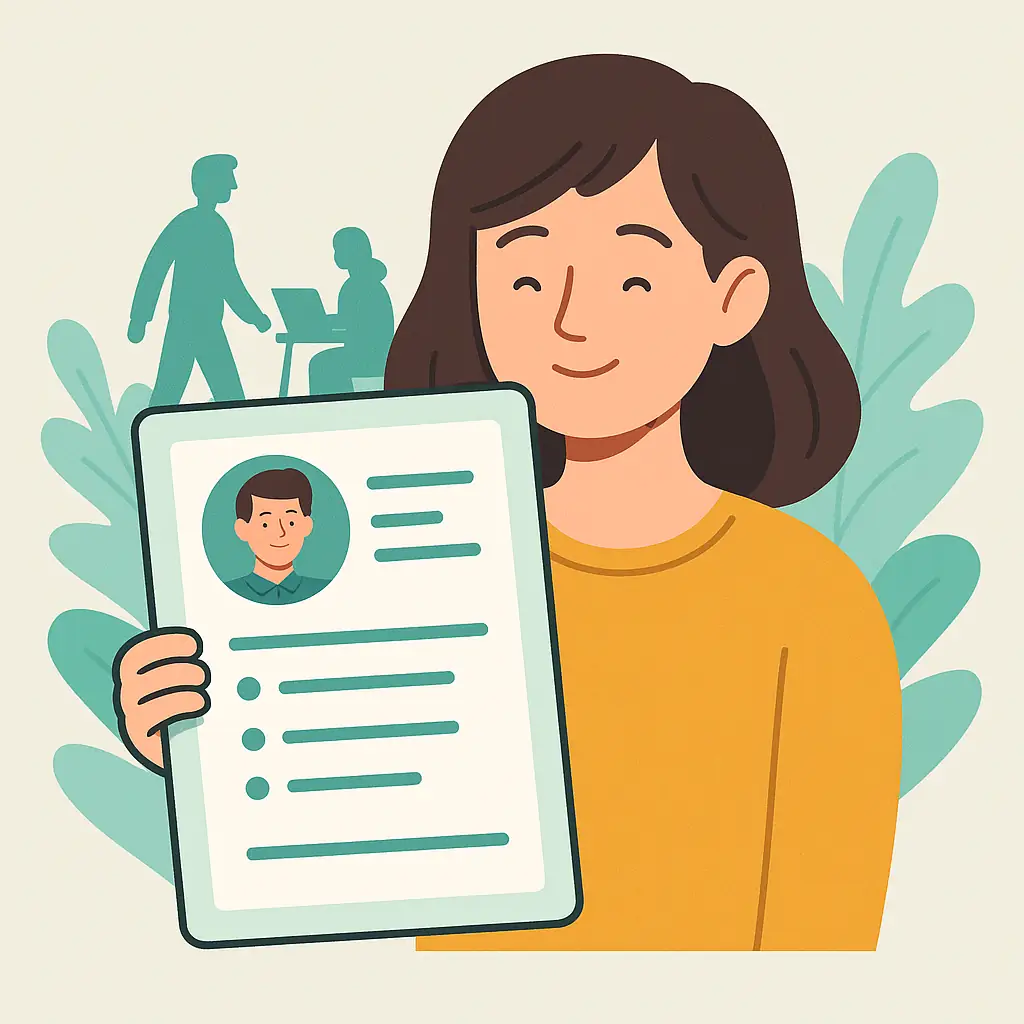Looking for your first job is an inspiring breakthrough that you will remember your lifetime, but a question arises: what should one include in their resume if they don’t have any formal work experience?
However, in reality, you’ve already built valuable skills and experiences through your education, volunteer work, and extracurricular activities which can also help you get your wished job. Even without full-time work experience, you can write a strong resume that highlights your education, skills, volunteer roles, and community involvement.
Let’s explore “how to write a resume for your first job”, “how to organize your experiences”, and “how to format everything to make a strong first impression.”
What is a Resume?
A resume is a formal document that outlines your background, skills, achievements, and experiences for potential companies. Your resume is usually the first thing a recruiter looks at when you submit a job application to determine whether you’re a good fit for the role. That’s why presenting your information clearly and professionally is so important, especially when you’re entering the official world for the first time.
How to Optimize Your Application?
Employers or hiring managers typically don’t have time to read every resume in full because they often receive dozens of applications for a single job. Instead, many companies use Applicant Tracking Systems (ATS), special software designed to sort resumes based on keywords and qualifications, which means that your resume might be scanned by a computer before it’s ever seen by a human. Hence, it’s essential to match your resume to the job description to increase your chances of getting noticed.
Here’s how you can do that:
- Carefully read through job postings that interest you.
- Focus on sections like “Key Qualifications,” “Minimum Requirements,” and “Job Responsibilities.”
- Write down keywords, required skills, and important attributes.
- Reflect on your experiences (whether from school, clubs, volunteer work, or side projects) that match and aligns with those skills.
- Incorporate those keywords naturally throughout your resume.
By tailoring your resume to each position, you escalate the probabilities that both the ATS and the hiring manager will recognize you as a good fit.
For quick, professional results, you might start with word resume templates that provide a polished structure you can then customize.
How to Structure Your Resume?
A strong structure makes it stress-free for recruiters to find what they need quickly.
The most recommended order for your first resume includes:
- Full Name
- Contact Information (Phone number, professional email address — you might consider creating a new email address just for job applications)
- Objective Statement (A brief summary of your career goals and key strengths)
- Skills (Both technical skills and soft skills)
- Experience (Any work, volunteer, or informal experience; listed chronologically from most recent to the least)
- Education (Include your school, graduation date or estimated graduation, GPA, academic achievements, and certifications)
- References (Only if specifically requested)
Following this format helps keep your resume clean, professional, and easy to navigate even if you have limited formal work experience.
How to Write a Resume for Your First Job
Many entry-level job listings request “relevant experience.” If you haven’t held a formal job yet, don’t worry! Relevant experience can come from a variety of sources including:
- Academic accomplishments
- Volunteer work
- Extracurricular activities
- Informal or freelance work (such as babysitting, tutoring, or managing a family business)
Your goal is to demonstrate your skills, your work ethic, and your ability to contribute to an organization.
Match Your Experiences to the Job Listing
A strong resume starts with understanding the job you’re applying for and you should
study the job description carefully before applying. There are some points you can try while writing your resume to make it standout, including:
- Highlight or list out key skills, abilities, and qualifications mentioned
- Pay close attention to those listed as “required” rather than “preferred.”
- Reflect on your experiences that align with those keywords
For example, if the job requires strong organizational skills, think about times when you organized a school event, led a group project, or managed a club activity.
You don’t need a one-to-one match for every skill, but finding ways to mirror the job requirements will strengthen your application.
Keep this list handy as you build your resume as it will help you tailor your content more effectively.
Feature Your Skills and Education
Since you might not have extensive work experience, your resume should showcase your skills and education prominently. Choose a resume template and format that brings your strengths to the top- a functional resume (skills-based) format is a great choice for first-time job seekers. To ensure relevant information is the first thing that captivates recruiter, consider formatting your resume in sections:
- Skills and Related Experiences or Project
- Education and Academic Achievements
- Volunteer Work and Extracurricular Activities
This format ensures that employers see your most relevant qualifications right away and you show up as their best candidate for that particular role.
Details to Include in the Education Section:
- School name and location
- Dates of expected graduation and previous classes
- Relevant coursework (especially those that matches the job description)
- GPA (particularly if 3.5 or higher)
- Academic achievements (like Dean’s List, academic scholarships, honour societies)
- Extracurricular activities (sports, student government, clubs)
- Certifications or online courses (bootcamps, workshops, or certifications outside school)
List the program as “In Progress” along with your expected graduation year if you’re still enrolled to avoid confusions.
Writing a Strong Resume Objective
Resume summary or career objective, commonly known as resume objective, is a short, one- or two-sentence section that highlights:
- Your professional goals
- Your strongest skills
- How you plan to contribute to the company
Including an objective statement at the top of your resume can make it easy for recruiters to get an idea of what you really are and what you can bring to the table.
Examples of resume objectives are:
- “Recent business school graduate seeking a full-time finance position to use analytical skills to help drive organizational success.”
- “Motivated team player and aspiring fashion buyer with strong communication abilities, aiming to expand knowledge of the couture industry and support customer service efforts at your boutique.”
Writing a clear and focused objective gives hiring managers a quick understanding of your personality and what you offer.
Highlight Volunteer Work, Internships, and Extracurricular Activities
Even if you don’t have formal work experience, you have relevant experience worth mentioning, including:
- Volunteer work (non-profit organizations, community service)
- Internships (even unpaid ones)
- Informal work (freelancing, tutoring, assisting family businesses)
- Club leadership roles (school clubs, sports teams)
When listing these experiences:
- Focus on the skills you developed,
- Relate them to the job description when possible,
- Use bullet points to describe your responsibilities and achievements, and
- Refer back to the job description to decide which experiences to prioritize
List Your Skills
Your resume should highlight both your soft skills and technical (hard) skills.
Soft Skills: These skills are the personal traits that influence how you work and interact with others. For example:
- Effective communication
- Teamwork and leadership qualities
- Decision-making
- Adaptability
- Time management
- Problem-solving
- Ability to work under pressure
Take help from your family, friends, and teachers if you’re unsure about your strongest soft skills and understand how they would describe you as their insights can be very helpful in determining the apt soft skills.
Technical (Hard) Skills: These skills are job-specific abilities you’ve learned through education, training, or practice. For example:
- Microsoft Office Suite (Excel, Word, PowerPoint)
- CRM systems (like Salesforce)
- Programming languages (Python, Java)
- Foreign languages
- Social media management
- Data analysis
When listing technical skill, consider the following key points:
- Be specific
- Indicate your level of proficiency when possible (e.g., “Adobe Suite (Intermediate level)”, “Tally (Professional Level)”)
Highlighting technical skills that match the job description gives you a major advantage over the rest of the candidatures!
Human Skills vs. Technical Skills
It’s important to understand the difference between the two skills to take the best out of them:
- Human skills (soft skills) apply to almost every job: leadership, communication, teamwork, etc.
- Technical skills (hard skills) are specific to certain roles: coding, operating machinery, design software expertise.
Your resume should present a healthy balance of both the skills!
Read More :- 100+ Technical Skills For Resume
Include a Tailored Cover Letter
A cover letter can be extremely beneficial when applying for your first job. It is not always mandatory to add one but incorporating a cover letter gives you an upper hand and gives you space to:
- Introduce yourself
- Explain why you’re interested in the job
- Highlight your relevant skills and experiences
- Show that you understand the company’s mission
- Demonstrate how you can add value
When writing your cover letter focus less on what you want from the job and more on what you can offer. Furthermore, elaborate on how your volunteer work, extracurricular activities, or coursework prepared you for the role, keeping it concise (aim for around 300 words or one page). For guidance on writing a brief but impactful application letter, review our short cover letter sample. Key points to include while writing a cover letter are:
- Who you are
- Relevant experiences and skills
- Your interest in the company and role
- A connection to the company’s goals or mission
- A well-written cover letter can significantly strengthen your application.
Tips for Preparing Your Resume for a First Job
Now that you have the basics, some of the additional tips to make your resume even stronger include:
Layout
- Keep the design simple and organized
- Use clear headings and bullet points
- Avoid using columns, as some ATS software can’t read them properly
Length
- Keep your resume to one page unless you have extensive extracurriculars or volunteer work that truly adds value.
Language
- Start bullet points with action verbs (e.g., designed, managed, improved, initiated)
- Avoid passive phrases (show what you did and accomplished)
Keywords
- Use the same terminology from the job description
- Tailor your resume for each application to increase your chances of passing ATS filters
Proofreading
- Carefully check for spelling, grammar, and punctuation errors
- Ask a friend, teacher, or family member to review your resume too after you have double-checked to have a different opinion
Contact Information:
- Include your full name, phone number, and a professional email address
- Ensure your voicemail message is polite and professional in case employers call you
Common Mistakes First-Time Resume Writers Make
Avoid these common mistakes to have a positive impression on recruiters:
- Being too indefinite: Use specific examples rather than generic phrases like “hard worker”
- Including irrelevant information: Focus only on experiences that relate to the job you’re applying for
- Using unprofessional email addresses: Create a new professional email if needed
- Ignoring the job description: Tailor each resume to the specific job instead of sending a generic resume
- Forgetting to proofread: Even a small typo can make a bad impression
- Making the resume too long: Keep it concise, ideally one page.
What to Do After Submitting Your Resume?
Submitting your resume is just the first step, in the next step, you can:
- Send a Follow-Up Email: It’s appropriate to send a polite follow-up email to express continued interest if you haven’t heard back after a week or two.
- Prepare for Interviews: Research common interview questions and practice answering them.
- Continue Applying: Don’t stop applying after one submission instead apply to multiple positions to improve your chances.
- Update Your Resume: Update your resume immediately if you gain a new skill, volunteer, or complete a project.
Being proactive shows recruiters and hiring managers that you are really serious about starting your career!
Final Thoughts
Every working professional once shaped their very first resume. Recruiters know that freshers may not have a long job history, and instead, they focus on potential, passionate, and convertible skills.
You can create a resume that makes a strong and positive impression by emphasizing your education, experiences, accomplishments, and personality traits that align with the job you’re applying for. You’ll be well on your way to landing your first job with a well-prepared resume and a little self-confidence!








